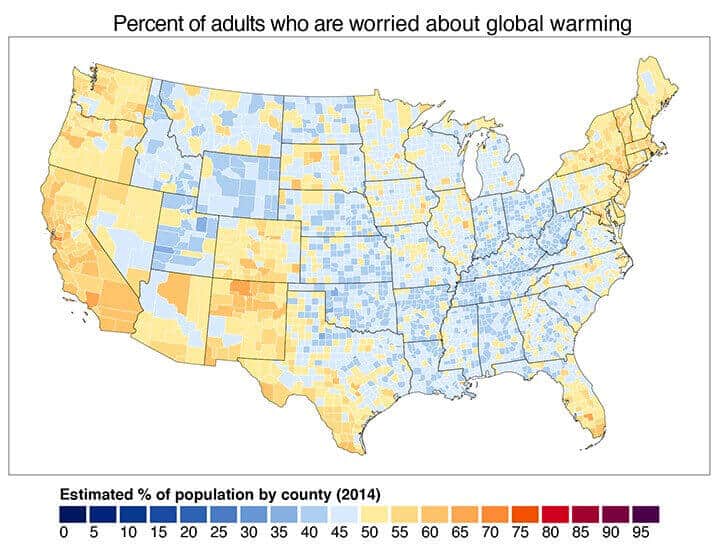A team of Yale researchers has developed a new statistical model that accurately estimates public climate change opinion and public policy support in all 50 states, 435 United State Congressional districts, more than 3,000 counties, and cities across the nation. The model allows users to explore public opinion in unprecedented geographic detail.
The model, which is described in the journal Nature Climate Change, was developed in partnership with Utah State University.
“Most of the action to reduce carbon pollution and prepare for climate change impacts is happening at the state and local levels of American society,” said Anthony Leiserowitz, a research scientist and faculty member at the Yale School of Forestry & Environmental Studies (F&ES). “Yet elected officials, the media, educators, and advocates currently know little about the levels of public and political will for climate action at these sub-national levels. State and local surveys are costly and time-intensive, and as a result most public opinion polling is only done at the national level.
“This model for the first time reveals the full geographic diversity of public opinion in the United States at these critical levels of decision making,” Leiserowitz said.
Using the results, the research team also constructed an interactive, online tool called “Yale Climate Opinion Maps,” which allows users to explore differences in public opinion in the United States.
Nationally, 52% of Americans are worried about global warming. But, as the results show, this national number glosses over the geographic diversity in public opinion across the country. Concern about global warming ranges from an estimated low of 38% in Pickett County, Tenn., to a high of 74% in Washington, D.C. The results also identify significant variation within states. For example, in Texas, public worry about global warming ranges from a low of 39% in King County to a high of 61% in Travis County.
“Although a majority of people in every state think global warming is happening, this analysis makes it possible to see how much opinions differ within each state,” said Peter Howe of Utah State University, the lead author of the paper. “These differences are partly due to the fact that different groups often think differently about the issue. For example, Hispanics and Latinos tend to be more worried about global warming than other racial or ethnic groups, which can be seen on the map in counties with more Latino residents.”
The estimates are derived from a geographic and statistical model using a large national survey dataset (n>13,000), along with demographic and geographic population characteristics. To validate the model, the research team conducted separate surveys in four states and two cities, and found the estimates were within three percentage points of the independent surveys at the state level and four percentage points at the city level. Overall, the accuracy of the model estimates is higher for geographic areas with larger populations.
In addition to Leiserowitz and Howe, principal investigators include Jennifer Marlon and Matto Mildenberger of Yale.
The research was funded by the Skoll Global Threats Foundation, the Energy Foundation, the 11th Hour Foundation, the Grantham Foundation for the Protection of the Environment, and the V.K. Rasmussen Foundation.



No wonder why the citizens of the US are so concerned about global warming: “the United States is the top global warming polluter in the world” according to statistics (read http://list25.com/25-alarming-global-warming-statistics/2/ to get complete list of 25 alarming global warming facts). Evidently, it’s not something to be proud of. Unfortunately, 5% of the population (US citizens) are concerned for 50% (average) about this fact. At the same time, the US is one of the countries, which has seas and oceans on both sides and actually suffer from deadly hurricanes during the recent years, but doesn’t coincide the consequences with the source. Such organizations as NASA do a lot ( http://climate.nasa.gov/ ), but probably not enough to control and moderate the influence or even inform in an adequate way to make it clear: “something should be done immediately”. While Americans are still searching for better life conditions, try to save money choosing products, which pollute our planet, constantly reside in debt consuming things they don’t even need ( read http://www.gradloanusa.com/about-cash-advance-usa.html to learn more ), we have very negative expectations about the future of our planet.